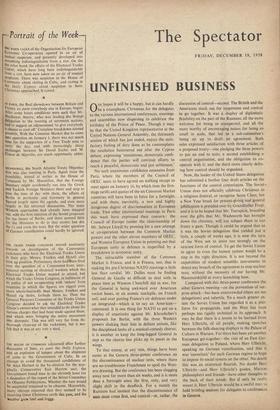UNFINISHED BUSINESS
ONE hopes it will be a happy, but it can hardly, be a triumphant, Christmas for the delegates to the various international conferences, meetings and assemblies now dispersing to celebrate the birthday of the Prince of Peace. Though it may be that the United Kingdom representative at the United Nations General Assembly, the thirteenth session of which has just ended, enjoys the satis- factory feeling of duty done as he contemplates the resolution hammered out after the Cyprus debate, expressing 'unanimous, democratic confi- dence that the parties will continue efforts to .'reach a peaceful, democratic and just settlement.'
No such Unanimous confidence emanates from Paris, where the members of the Council of OEEC seem to have agreed on nothing except to meet again on January 16, by which time the first- stage tariffs and quotas of the six Common Market countries will have been in force for a fortnight, and with them, inevitably, a new and highly dangerous degree of discrimination in European trade. Two other international meetings in Paris this week have expressed their concern : the Council of Europe (under the chairmanship of Mr. Selwyn Lloyd) by pressing for a new attempt at co-operation between , the Common Market powers and the other eleven members of OEEC, and Western European Union in pointing out that European unity in defence is imperilled by a breakdown in economic unity.
The intractable member of the Common Market is France, and it is France, too, that is making the pre-Christmas NATO meetings a little less than cordial. Mr. Dulles must be finding General de Gaulle as difficult to deal with in peace time as Winston Churchill did in war, for the General is being awkward over American rocket bases, or an atomic stockpile, on French soil; and over putting France's air defences under an integrated—which is to say an American— command. It is one thing for NATO to put on a display, of unanimity against Mr. Khrushchev's proposals for Berlin, with the three Western powers shaking their fists in defiant unison, like the disciplined limbs of a musical-comedy chorus; it is another to keep the long-legged General in step as the chorus line picks up its paces in the wings.
To that extent, at any rate, things have been easier at the Geneva three-power conference on, the discontinuance of nuclear tests, where there are no troublesome Frenchmen to spoil the West- ern dressing. But the conference has been slogging away now for more than six weeks, and it is more than a fortnight since the first, only, and very slight shift in the deadlock. For a month the Russians had 'insisted that the discontinuance of tests must come first, and control—or, rather, the discussion of control—second. The British and the Americans stuck out for suspension and control to go together. It was a display of diplomatic flexibility on the part of the Russians, all the more welcome for being so unexpected, and all the more worthy of encouraging noises for being so small in scale, that led to a sub-committee's being set up to draft an agreement. Both sides expressed satisfaction with three articles of a proposed treaty—one pledging the three powers to put an end to tests; a second establishing a control organisation, and the obligation to co- operate with it; and the third more clearly defin- ing how control should be organised.
Now, the leader of the United States delegation has submitted a further four draft articles on the functions of the control commission. The Soviet • Union does not officially celebrate Christmas as a religious festival, or recognise Santa Claus, but a New Year break for present-giving and general jollification is presided over by Grandfather Frost, and it is to be' hoped that Mr. Tsarapkin, brooding over the gifts that Mr. Wadsworth has brought down the chimney, will not subject them to too frosty a gaze. Though it could be argued that as it was the Soviet delegation that yielded just a little, a couple of weeks ago, it is now the turn of the West not to insist too strongly on the strictest form of control. To get the Soviet Union to agree to even the loosest system would be a step in the right direction. It is not beyond the capabilities of modern scientific instruments to detect any breach of the agreement to stop nuclear tests, without the necessity of our having Mr. Hammarskjold at every launching base.
Compared with this three-power conference the other Geneva meeting—on the prevention of sur- prise attack—has been overcrowded (there are ten delegations) and infertile. To a much greater ex- tent the Soviet Union has regarded it as a plat- form for propaganda, and the West has been perhaps too rigidly technical in its approach. It may be that there is a lesson to be learned from Herr Ulbricht, of all people, making speeches between the folk-dancing displays in the Palace of Culture in Warsaw. For there has been yet another European get-together—the visit of an East Ger- man delegation to Poland, where Herr Ulbricht, speaking on German reunification, said that it was `unrealistic' for each German regime to hope to impose its social system on the other. No doubt this was an oratorical flourish. No doubt Herr Ulbricht—and Herr Ulbricht's guides, Marxist philosophers and friends—have other thoughts in the back of their minds. But if only he really meant it, Herr Ulbricht would be a useful man to hold briefing sessions for delegates to conferences in Geneva.

























 Previous page
Previous page